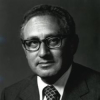Henry A. Kissinger

Henry A. Kissinger
Henry Alfred Kissingeris an American diplomat and political scientist. He served as National Security Advisor and later concurrently as United States Secretary of State in the administrations of presidents Richard Nixon and Gerald Ford. For his actions negotiating the ceasefire in Vietnam, Kissinger received the 1973 Nobel Peace Prize under controversial circumstances, with two members of the committee resigning in protest. Kissinger later sought, unsuccessfully, to return the prize. After his term, his advice has been sought by world leaders...
NationalityGerman
ProfessionStatesman
Date of Birth27 May 1923
CountryGermany
There are some people who think that at some time in the future, China may challenge us for supremacy in the Pacific, and therefore, what do we do today to prevent that? And you, of course, will say that we will try to thwart any economic progress in China. If we engaged in such a policy, we would turn a billion-plus people into nationalist opponents of the United States.
It is not a matter of what is true that counts, but a matter of what is perceived to be true.
You become a superpower by being strong but also by being wise and by being farsighted. But no state is strong or wise enough to create a world order alone.
Clearly security without values is like a ship without a rudder. But values without security are like a rudder without a ship.
I don't know what happens in the next years. But I cannot now design a policy in which we try to keep China from developing, because in some years, if they develop, they might be rich enough to challenge us, and adopt the principle that we will hold down any state that might in the future become strong. That would make us a world empire for which we wouldn't have the talents or the convictions.
The security of Israel is a moral imperative for all free peoples.
If you do not know where you are going, every road will get you nowhere
The superpowers often behave like two heavily armed blind men feeling their way around a room, each believing himself in mortal peril from the other, whom he assumes to have perfect vision.
I have been observing China for more than 30 years and am impressed how logically and wisely it tackles its problems. Obviously the international system could be unbalanced by China's rising power - if we don't prepare ourselves for the new competitive situation, that is. But it is an economic challenge, not aggression on the level of Hitler.
The emergence of a unified Europe is one of the most revolutionary events of our time.
A bluff taken seriously is more useful than a serious threat interpreted as a bluff.
It is an act of insanity and national humiliation to have a law prohibiting the President from ordering assassination.
In the period after the Second World War, there were still leaders in Europe who represented weak countries, but possessed a sense of global foreign policy. Nowadays, on the other hand, there are politicians who represent pretty powerful countries, but whose citizens are not prepared to sacrifice themselves for the state.
Most foreign policies that history has marked highly, in whatever country, have been originated by leaders who were opposed by experts.